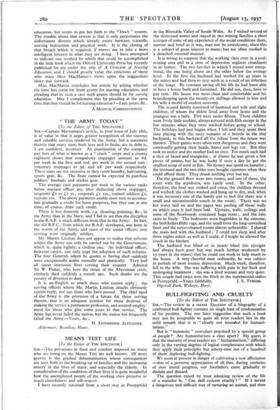MEANS TEST LIFE [To the Editor of THE SPECTATOR.] SIR,—The
privations in -food and comfort imposed on many who are living on the Means Test are well known. Of more gravity is the gradual dehumanisation whose consequences are seen both in the breaking-up of families and the increasing misery in the lives of many, and especially the elderly. In consideration of the conditions of their lives it is quite wonderful how the unemployed people of the working class preserve so much cheerfulness and self-respect.
I have recently returned from a short stay at Pontypridd in the Rhondda Valley of South Wales. As I visited several of the distressed towns and stayed in two mining families a short account of some of my experience of the social conditions there, narrow and brief as it was, may not be unwelcome, since this is a subject of great interest to many, but too often studied in a detached external manner.
It is wrong to suppose that the working class even in a coal- mining area and in a time of depression neglects cleanliness in its homes. The two families in which I stayed were excep- tional, the one being above and the other below the average level. In the first the husband had worked for 43 years in the mines and had then to stop work as a result of an infection of the lungs. By constant saving all his life he had been able to have a house built and furnished. He did not, then, have to pay rent. His house was most clean and comfortable and his housekeeping upon the twenty-six shillings allowed to him and his wife a model of modest economy.
The second family consisted of husband and wife and eight children, of whom the eldest lived away from home and the youngest was a baby. Five were under fifteen. These children were lively little urchins, always covered with filth except in the few minutes when they were washed before going to school. The holidays had just begun when I left and they spent their time playing with the rusty remains of a bicycle in the tiny backyard; in this backyard all the refuse from the house was thrown. Their games were often very dangerous and they were continually getting their heads, knees and legs cut. But they took no.notice and the mother had no time. For meals each had a slice of bread and margtrine ; at dinner he was given a &sir pieces of potato, but he was lucky if once a day he got the smallest scrap of meat or fish. No money was spent on luxuries ; the husband and the two elder sons bought cigarettes when they could afford them. They drank nothing ever but tea.
On the ground floor were two rooms, and one of these, the room with the aspidistra, was rarely used. In the other, therefore, the food was cooked and eaten, the children dressed and washed, the clothes washed and hung uti to dry, and, wheii it was necessary one of the family put to bed (for there was a small and uncomfortable couch in the room). There was no hot water laid on and the paper was peeling off those walls on which once it had been laid. Upstairs, 'walls, ceilings, and some of the floorboards contained huge rents ; and the rain came in freely. The bedrooms were bugridden in the extreme, the bedclothes filthy rags, and the smell from the long-unwashed linen and the never-cleaned rooms almost unbearable.. I shared the main bed with the husband ; I could not sleep and after three nights asked, as well as I could, if I might be allowed the couch in the kitchen.
The husband was blind or so nearly blind (his eyesight had always been poor but was much further weakened by 23 years in the mines) that he could not work or help much in the house. A very cheerful man ordinarily, he was subject to periods of most intense depression. Much work, therefore; fell to the wife. She was suffering with pain in her back and undergoing treatment ; she was a tired woman and very quiet. This couple had twice won the flitch in the matrimonial stakes at Pontypridd.—Yours faithfully, J. S. TURNER. Digswell Park, Welwyn, Herts.






































 Previous page
Previous page